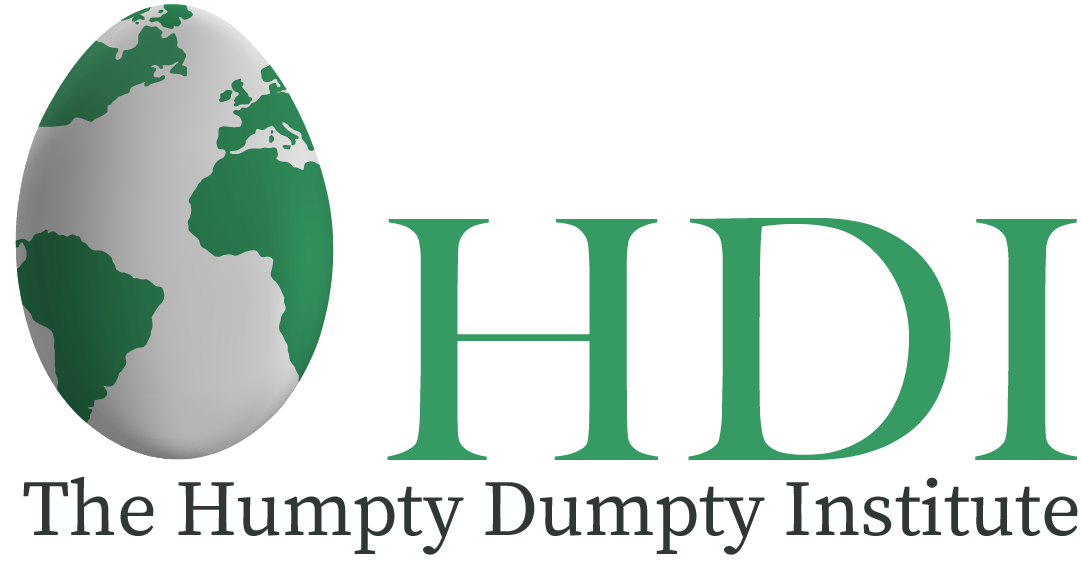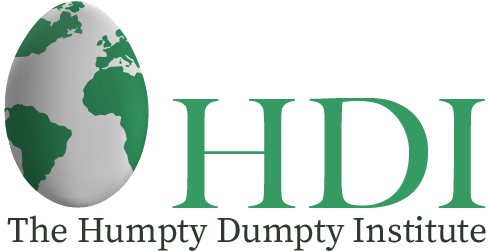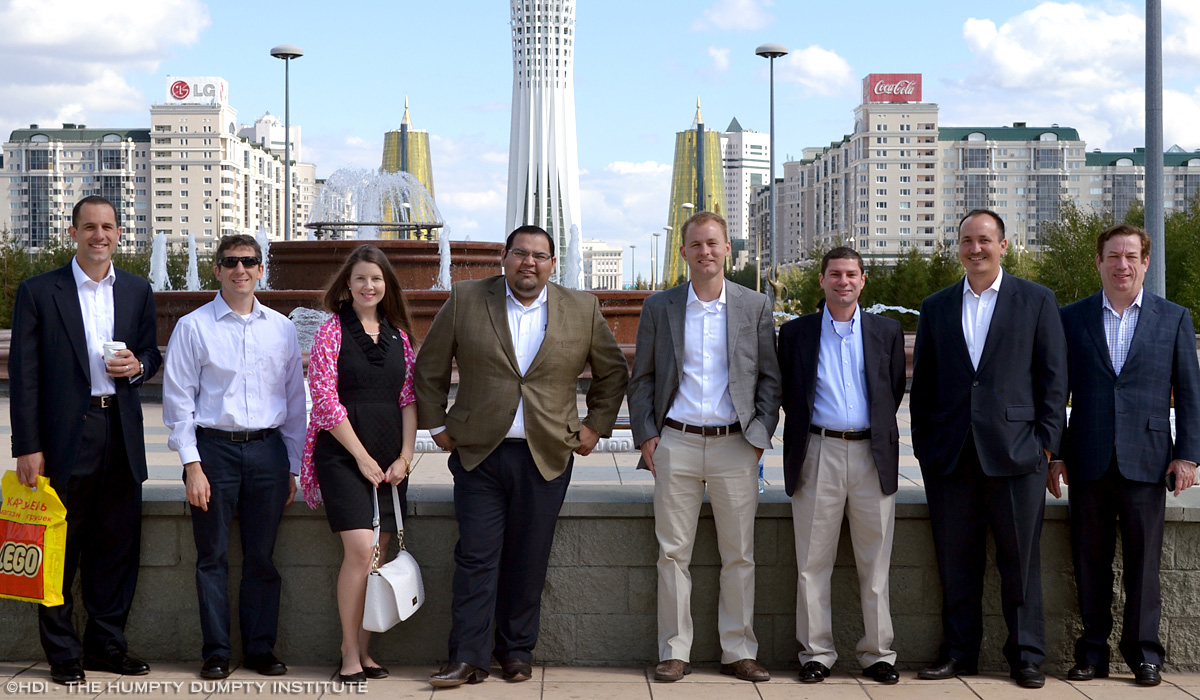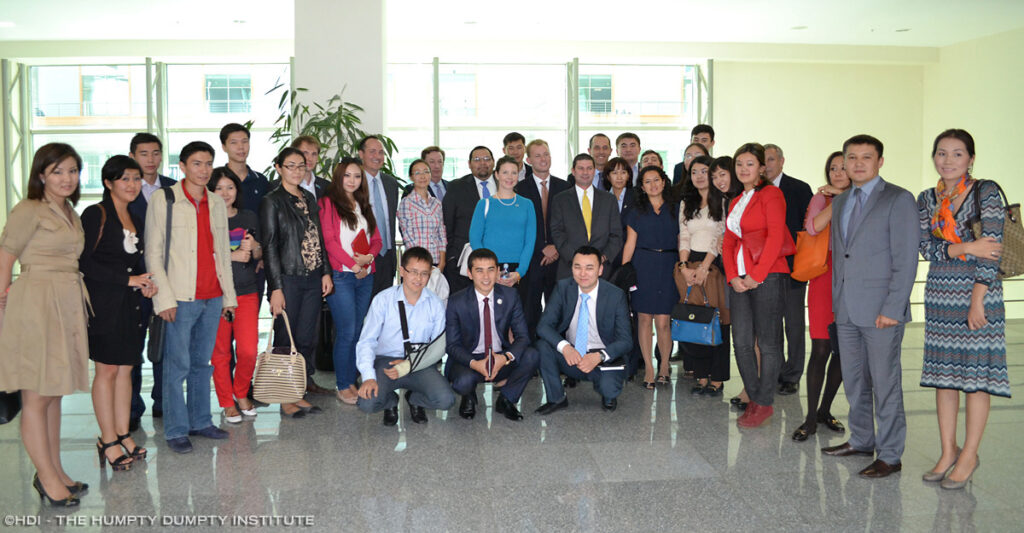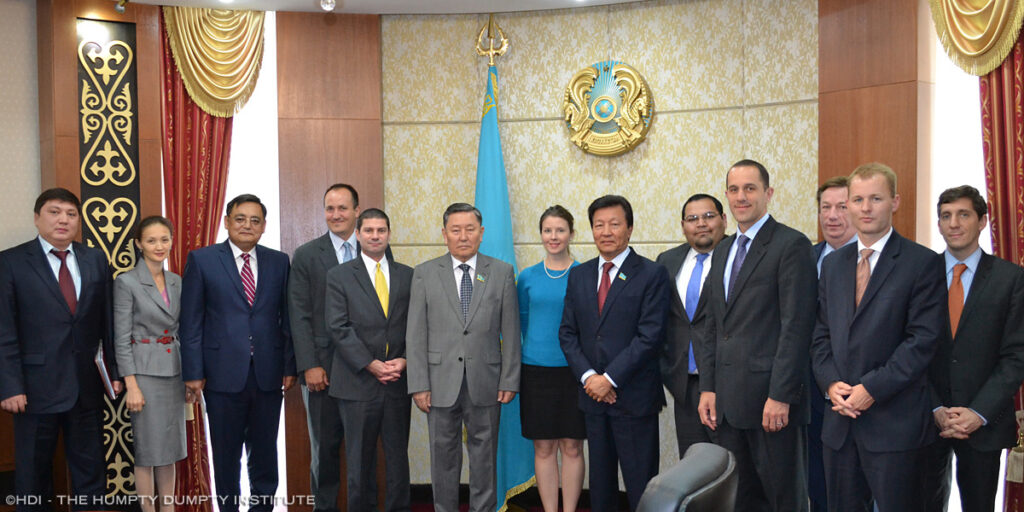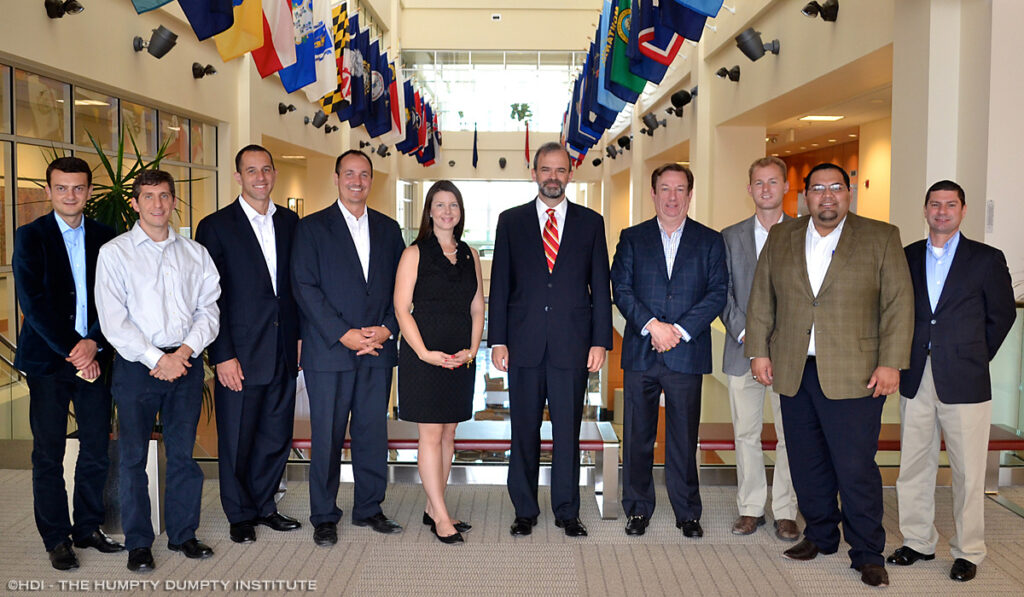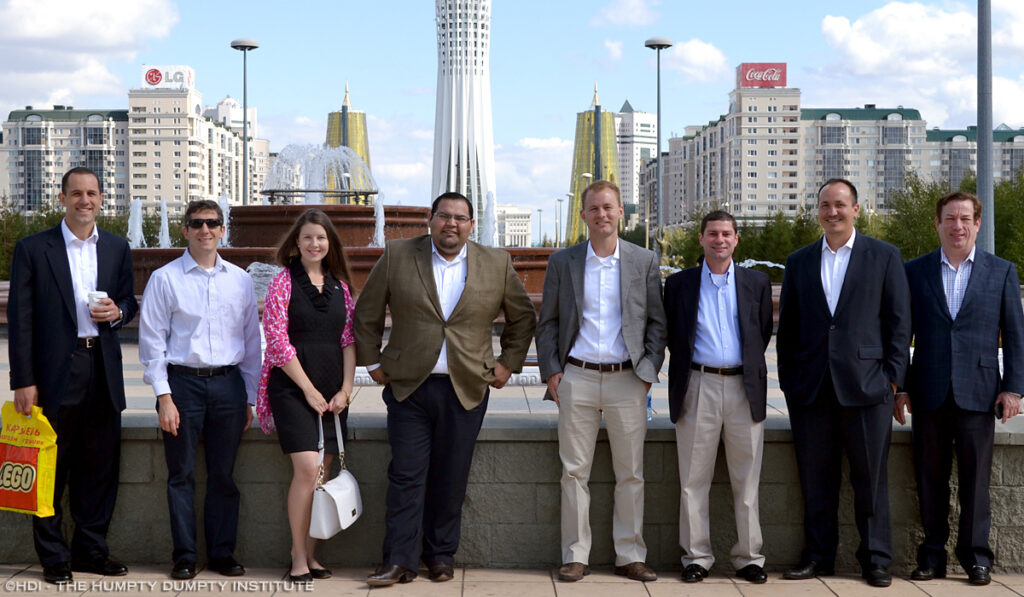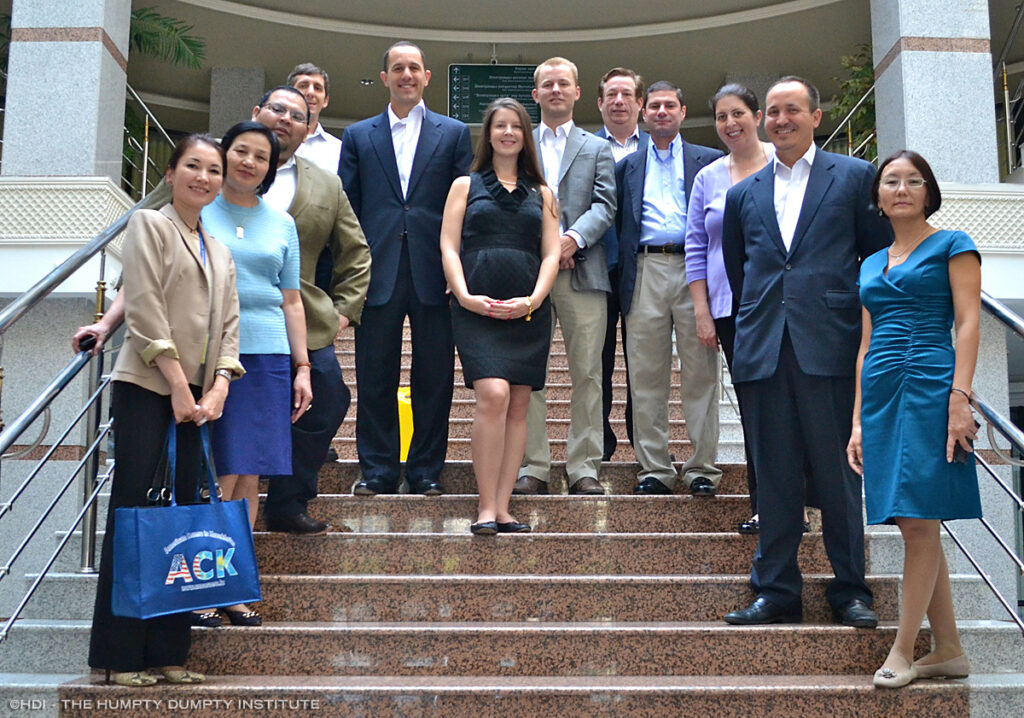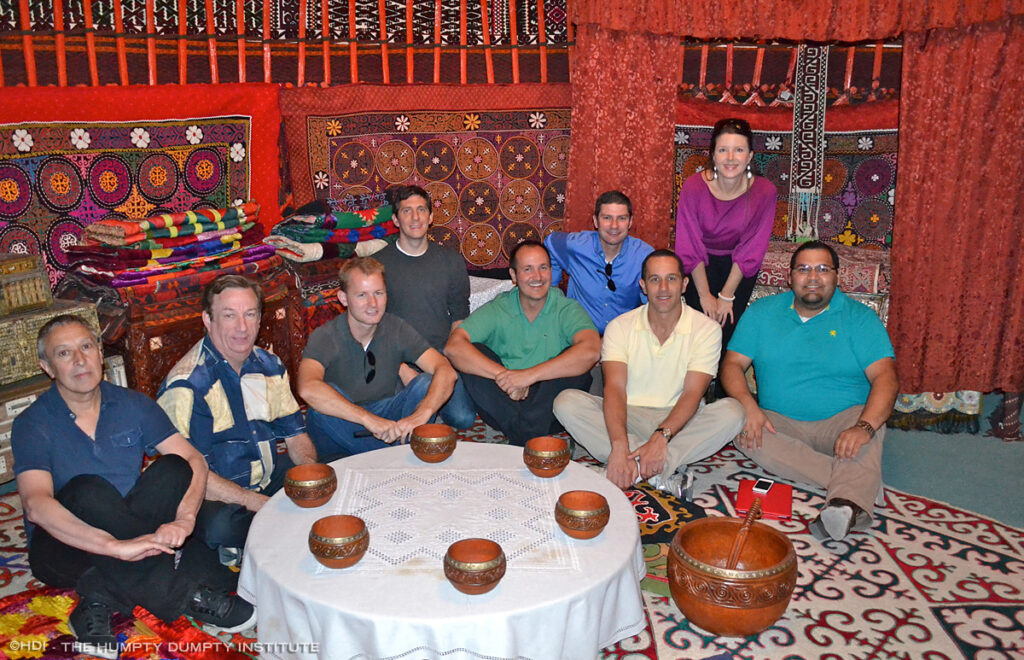On Saturday, August 25, The Humpty Dumpty Institute (HDI) departed Washington, D.C. on a Congressional Staff Delegation to Astana, Republic of Kazakhstan. The trip took place under the auspices of the recently signed Mutual Educational and Cultural Affairs Act (MECEA) agreement between the United States and the Republic of Kazakhstan. MECEA agreements are intended to familiarize Members of Congress and Staff with the culture, history and politics of the signatory countries. The focus of this trip was the current state of affairs in the Republic of Kazakhstan, the rule of law and the importance of strong U.S./Kazakhstan ties. The delegation met with senior level Kazakh policy makers and leaders in the area of politics, economics, and culture.
The delegation arrived on the morning of Monday, August 27, and had an organizational lunch at a local restaurant where they were introduced to traditional Kazakh dishes. The official program began the same afternoon with a visit to the American Corners, a U.S. Department of State program (www.amcorners.kz) located at the National Academic Library of the Republic of Kazakhstan. The participants learned that the primary mission of American Corners, which has 12 locations throughout Kazakhstan, is to introduce local residents to American culture and values by providing access to literature, movies, discussion classes, and music. Following this visit, the group was briefed by U.S. Ambassador Kenneth J. Fairfax on developments in the U.S./Kazakhstan bilateral relationship and programs designed to increase trade as well as cultural and educational exchanges. The Ambassador commended the Kazakh government’s extensive involvement in nuclear disarmament and stressed the importance of robust U.S./Kazakhstan engagement to promote regional stability. Before attending the opening reception of the International Conference “From a Nuclear Test Ban to a Nuclear-Weapons-Free World,” hosted by the Mayor of Astana Mr. Imangali Tasmagambetov, the group received an orientation tour of the architecturally unique city of Astana. At the reception, the delegation met with parliamentarians from around the world and became acquainted with traditional Kazakh music. On Tuesday, August 28, the participants had a meeting with the Head of Youth Policy Committee of the Ministry of Education and Science, Mr. N. Uteshev. Mr. Uteshev discussed the structure of the Kazakh educational system and planned future developments. He highlighted the “Bolashak” (“Future”) program which allows Kazakh students to travel and receive post-secondary education abroad. This government-sponsored grant program is rapidly expanding to give the youth of Kazakhstan an opportunity to broaden their education and to have a range of disciplines to choose from at various colleges and universities. The “Bolashak” program ensures the transition of the returning students’ into the Kazakh workforce and the economy. Mr. Uteshev also told participants that more colleges and universities are being built around the country to allow the local population access to post-secondary education in order to sustain the development of Kazakhstan. The next meeting was with Mr. Adil Akhmetov, a member of the Kazakhstan Senate and head of the Senate Committee on Foreign Relations and Defense. Senator Akhmetov highlighted the importance of cooperation between the governments of the Republic of Kazakhstan and the United States. He explained the Senate’s planned schedule for the rest of 2012 and gave an overview of the structure of the Kazakh Parliament. After the meeting, the delegation had the opportunity to visit Nazarbayev University (http://nu.edu.kz) and meet with the students. Nazarbayev University is a unique English language public university which prepares graduates for careers in international trade, commerce, and diplomacy. After touring the facilities, the participants had a discussion with students about the future of mutual cooperation between American and Kazakh higher education institutions.
Wednesday, August 29, was devoted entirely to the International Conference “From a Nuclear Test Ban to a Nuclear-Weapons-Free World.” This conference was organized by the government of the Republic of Kazakhstan in order to promote nuclear disarmament on an international level. Participants included parliamentarians and diplomats from around the world. The keynote speaker for this event was President Nursultan Nazarbayev who in his speech emphasized Kazakhstan’s commitment to nuclear disarmament and further cooperation with the United Nations in advancing this agenda. President Nazarbayev’s speech was followed by remarks from Miroslav Jenca, Special Representative of the U.N. Secretary-General and Head of the U.N. Regional Center for Preventive Diplomacy for Central Asia; Valentina Matvienko, Chairperson of the Council of the Federation of the Federal Assembly of the Russian Federation; Guido Westerwelle, Minister of Foreign Affairs of the Federal Republic of Germany; Eni Faleomavaega, United States Congressman (and member of HDI’s Congressional Advisory Board); Douglas Roche, Chairman Emeritus of the Middle Powers Initiative, former Canadian Ambassador for Disarmament, Honorary Senator, and former Chairman of the United Nations Disarmament Committee. This panel of speakers commended the efforts of Kazakhstan towards nuclear disarmament and emphasized their respective government’s commitment to further talks on nuclear disarmament within the established U.N. framework. The next panel discussion focused on the Comprehensive Test Ban Treaty—a building block for a nuclear-weapons-free world. This panel included Karipbek Kuyukov, a nuclear test victim and an artist who has been heavily involved in nuclear test ban movements worldwide (http://www.theatomproject.org). Other speakers included foreign diplomats and NGO representatives. The conference was followed by a lunch and meeting with a representative of the Mazhilis-lower house of the Parliament, Mr. Kamal Burkhanov. Mr. Burhanov is member of the Social and Cultural Development Committee of the Mazhilis and explained to the delegation the structure and agenda of the various committees within the Parliament. The day ended with a concert that included performances depicting traditional Kazakh folklore, classical musical pieces, ballet, and a closing performance led by a children’s choir.
On August 30, the last day of events, the delegation enjoyed a cultural program that started with a visit to the Atameken, a map of Kazakhstan depicted as a model covering an area larger than a football field. The delegation experienced the historical landmarks of Kazakhstan by taking a walking tour of the complex. The next stop was a visit to a memorial museum ALZHIR, a Russian acronym for the Akmolinskii Camp for Wives of Traitors of the Motherland, where the delegates received a guided tour of the complex. This memorial museum is dedicated to the women imprisoned here during the Stalin Soviet Era. Afterwards, the participants visited the President’s Cultural Center and received a guided tour of this museum which includes exhibits depicting centuries of history and culture of the Kazakh people. The scheduled program was concluded with a meal at a traditional Central Asian restaurant where the participants tasted Kumis, a fermented dairy product made from mare’s milk. The rest of the day was spent sightseeing and exploring the city of Astana.
Participants:
Mark Walker – Chief of Staff, Representative Dan Burton (R-IN )
Eduardo Lerma – Legislative Director, Representative Loretta Sanchez (D-CA)
Scott Goldstein – Legislative Director, Representative Hank Johnson (D-FA)
Carson Middleton – Legislative Assistant, Representative Joe Pitts (R-PA)
Kara Spencer – Legislative Assistant, Representative Mike McIntyre (D-NC)
Lars Hydle – Legislative Counsel, Representative Ed Towns (D-NY)
David Grimaldi – Chief of Staff, Office of Commissioner Mignon L. Clyburn, FCC
For more information, please contact Boris Shapoval boris.shapoval@thehdi.org
All The Humpty Dumpty Institute organized Congressional travel is approved by the Ethics Offices of the U.S. House and the U.S. Senate and follow all guidelines for travel by USG employees as prescribed by U.S. Department of State regulations.
